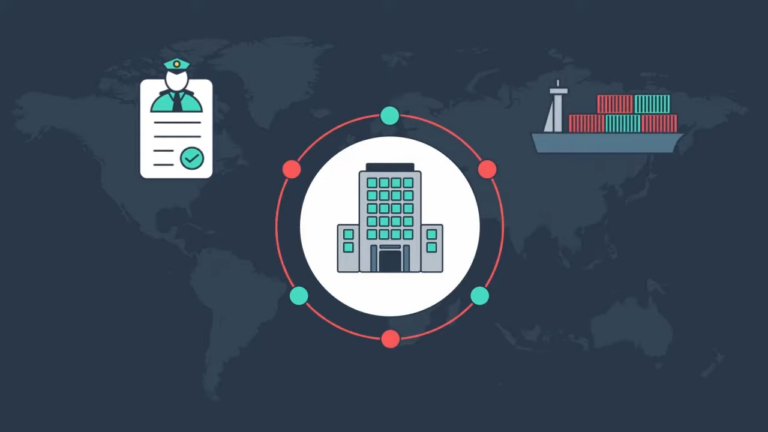Starting a freight forwarding business is a challenging yet rewarding venture, offering the potential for growth in the ever-evolving global trade landscape. Here’s a comprehensive guide to help you navigate the intricacies of this industry.
1. Understanding the Freight Forwarding Industry

Freight forwarding is a vital component of international trade, facilitating the movement of goods across borders. Forwarders act as intermediaries between shippers and transportation services, leveraging their expertise in logistics to ensure efficient and cost-effective shipping solutions.
This industry requires a deep understanding of varying international regulations, customs procedures, and transportation options. Learn more about freight forwarding at Qube Cargo.
2. Developing a Business Plan
A well-crafted business plan is the cornerstone of any successful enterprise. In the context of freight forwarding, this plan should detail your market analysis, target clientele, services offered, and pricing strategy.
It’s crucial to identify your niche – whether it’s specializing in certain types of cargo, specific geographic regions, or unique services like temperature-controlled shipping. This plan will guide your operations and serve as a persuasive document for potential investors or lenders.
3. Securing the Necessary Licenses and Permits
Compliance with legal requirements is non-negotiable in the freight forwarding business. This includes obtaining the necessary licenses and permits for operation. In many countries, freight forwarders must be licensed or registered with national transportation authorities.
Additionally, international operations may require specific permits and adherence to regulations like the International Air Transport Association (IATA) for air freight or the Federal Maritime Commission for ocean shipping.
4. Building Industry Relationships and Networks
Strong relationships with carriers, port officials, customs agents, and other freight forwarders are instrumental in this industry. Networking can lead to better rates, updated information on regulations, and potential partnerships. Attend industry conferences, join professional organizations, and engage with online communities to build these vital connections.
5. Investing in Technology and Infrastructure
In today’s digital age, investing in the right technology is crucial for efficiency and competitiveness. Freight forwarding software can streamline operations, from managing shipments and tracking cargo to handling documentation and invoicing.
Additionally, consider the physical aspects of your operation – warehouse space, transportation equipment, and any other infrastructure necessary for your specific services.
6. Understanding and Managing Risk
Freight forwarding involves inherent risks – from cargo damage and delays to fluctuating market conditions. Understanding these risks and having strategies to manage them is vital. This includes offering or arranging for cargo insurance, having contingency plans for transportation disruptions, and staying informed about global events that could impact trade routes or regulations.
7. Marketing and Client Acquisition

Effective marketing is essential to attract and retain clients. Develop a strong brand identity and an online presence through a professional website and social media engagement.
Tailor your marketing efforts to highlight your unique services and expertise. Building a reputation for reliability and excellent customer service can also lead to word-of-mouth referrals, which are invaluable in this industry.
8. Continuously Adapting and Evolving
The global trade landscape is constantly changing, influenced by economic conditions, political events, and technological advancements. Successful freight forwarders must stay informed and adapt to these changes.
This means regularly updating your knowledge of international trade regulations, exploring emerging markets, and embracing new technologies that can improve your services.
9. Financial Management and Cost Control
Effective financial management is crucial for the sustainability and growth of your freight forwarding business. This encompasses budgeting, monitoring cash flow, managing expenses, and pricing your services competitively.
Cost control is particularly important in an industry with thin margins and high competition. Negotiate favorable rates with carriers and suppliers, and continually look for ways to operate more efficiently. Utilizing technology for automating processes can also lead to significant cost savings.
10. Training and Developing Your Team

The success of your freight forwarding business heavily relies on the skills and expertise of your team. Invest in training programs to ensure that your employees are up-to-date with the latest industry practices and technologies.
Encourage a culture of continuous learning and improvement. A knowledgeable and motivated team will not only enhance operational efficiency but also improve customer experiences, leading to better business outcomes.
11. Compliance and Ethical Practices
Adhering to legal requirements and ethical standards is critical in the freight forwarding industry. This includes compliance with international trade laws, customs regulations, and environmental guidelines.
Implementing strict ethical practices protects your business from legal issues and enhances your reputation. Conduct regular compliance audits and train your staff on ethical business practices, including anti-corruption measures and sustainability initiatives.
12. Exploring International Opportunities
As a freight forwarder, the global market offers vast opportunities for expansion. Exploring international trade lanes and establishing connections with overseas partners can open up new avenues for business growth.
However, this requires a thorough understanding of international market dynamics, cultural nuances, and foreign regulatory environments. Start by focusing on a specific region or trade lane where you see potential and gradually expand your reach.
13. Leveraging Digital Marketing

In today’s digital world, an online presence is indispensable. Develop a digital marketing strategy to reach a wider audience and establish your brand in the market.
This includes optimizing your website for search engines, engaging with potential clients on social media, and using email marketing to nurture leads. Consider using online platforms for content marketing, such as blogs and webinars, to showcase your expertise and provide valuable information to your audience.
14. Planning for Scalability and Growth
As your freight forwarding business starts to gain traction, plan for its scalability and growth. This might involve expanding your service offerings, entering new markets, or scaling up your infrastructure.
However, growth should be managed carefully to maintain service quality and financial stability. Set realistic growth targets and develop scalable processes and systems to accommodate increased business volume without compromising on service standards.
End Note
In summary, starting and running a successful freight forwarding business requires a multifaceted approach. It’s about understanding the industry’s intricacies, developing a solid business foundation, delivering exceptional customer service, managing your finances effectively, investing in your team, adhering to compliance and ethical standards, exploring new markets, leveraging digital marketing, planning for growth, and staying informed about industry trends.











